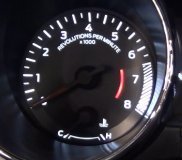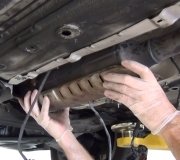There's no way to contact me directly right now. There used to be, and the site owners are doing a bunch of updates, so that might be possible again in the future. There's a few people I'd like to contact too to pick their brains.
You can reply to this thread anytime. Some replies come weeks or months after the last one.
As far as when I'm here, it varies. I had a major house fire almost a year ago, so I have to drive 10 miles into town to sit in the public library and use their wireless internet. I can do that from my van in the parking lot too, but it's 0 degrees right now, and I can't hold up to that more than about an hour after they close at 8:30 p.M. Sometimes I show up after midnight, but I can only stay as long as my laptop battery holds out.
Don't be thinking about the fuel pump yet. There's two common things to keep in mind. First, GM fuel pumps typically fail while you're driving leaving you sitting on the side of the road. Chrysler pumps very rarely fail once they've started up and you're driving. They typically fail to start up, leaving you sitting in your driveway or parking lot. Banging on the fuel tank often gets them going again. Also, GM does have some running problems caused by low fuel pressure, but that has more to do with some of their less-common injector designs. Low pressure isn't a problem for Chrysler's fuel injectors. My daily driver is an old rusty trusty '88 Grand Caravan; the last one left on the road in the middle of road salt country. (I'm looking for a rust-free one from down south). I DID have an intermittent problem that I was chasing for a year and a half, so I had a fuel pressure gauge hooked under the wiper arm to see what was happening. It turned out to be a burned terminal on the pump motor itself, but I learned that my engine runs perfectly normally down to 20 psi, and it starts to sputter at 15 psi. Normal pressure is between 45 and 50 psi. I'm not aware of any other engine that will still run well with the fuel pressure that low.
The second thing to consider is a plugged pickup screen inside the fuel tank. This doesn't apply to your symptoms, but keep it in mind if this happens in the future. Chrysler fuel filters commonly last the life of the vehicle, and you'll never solve a running problem by replacing it, except on diesel trucks. The pickup screen is a different story though. If it collapses from suction, or gets plugged, the engine will run fine at highway speeds, but it will stall when the largest volume of fuel is being pumped, ... Which is during coasting. This has happened twice to my van. In both cases the fix was a new screen costing 12 bucks. It just snaps onto the pump assembly. All auto parts stores have them in stock.
One more thing to be aware of is repeated fuel pump failures. The common scenario is the original one fails all of a sudden, you replace it with a perfectly fine aftermarket pump which fails again within a few weeks. The next two or three warranty replacements do the same thing, so out of desperation you buy one from the dealer and have no more problems. The actual cause of the repeat failures is microscopic debris in the tank that plugs the impeller in the pump. Chrysler pumps are built with very tight tolerances which makes them real quiet compared to other car manufacturers' pumps, but that makes them more susceptible to that debris. Each replacement pump collects some of that debris until it's all gone by the time you put the dealer's pump in there. (I don't know about other car parts stores, but the pumps NAPA sells are made by the same manufacturer that sells them right to Chrysler, so you're actually getting the same pump as the dealer sells).
The correct fix for this is to have the tank steam-cleaned at a radiator shop, THEN install the new pump.
Tuesday, December 30th, 2014 AT 5:34 PM



